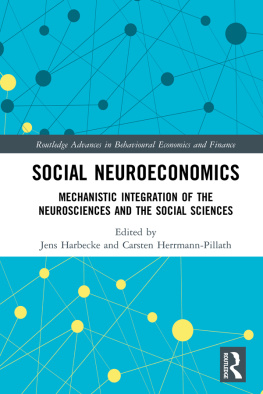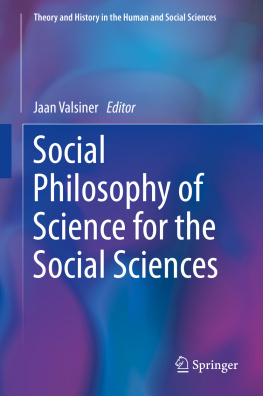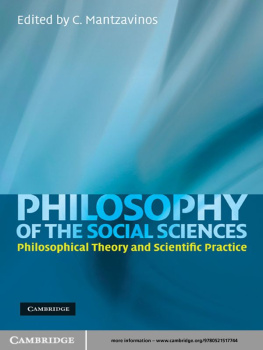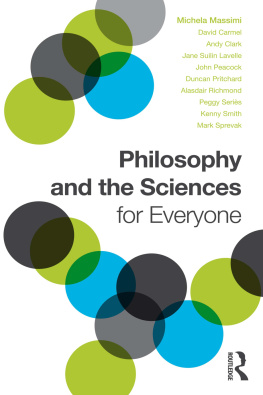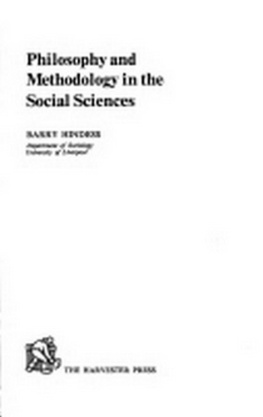The Philosophy
of the Social
Sciences
For Robin and Mus
First published in 1978
by Methuen & Co Ltd
This edition published in the Taylor & Francis e-Library, 2006.
To purchase your own copy of this or any of Taylor & Francis or Routledges collection of thousands of eBooks please go to www.eBookstore.tandf.co.uk.
Simultaneously published in the USA and Canada
by Routledge
29 West 35th Street, New York, NY 10001
1978 Vernon Pratt
All rights reserved. No part of this book may be reprinted or reproduced or utilized in any form or by any electronic, mechanical, or other means, now known or hereafter invented, including photocopying and recording, or in any information storage or retrieval system, without permission in writing from the publishers.
British Library Cataloguing in Publication Data
A catalogue record for this book is available from the British Library.
ISBN 0203392760 Master e-book ISBN
ISBN 020339559-X (Adobe eReader Format)
ISBN 0415042887 (Print Edition)
Contents
Preface
I have written this book very deliberately for people to whom philosophy as an academic subject is unfamiliar, in the belief that they are missing something important. The person I have had in mind is the student of social science, not ill disposed towards philosophy as broadly conceived, but often developing an entrenched hostility when detail and manner of argument, no matter how misleadingly, create a sense of irritating and burdensome irrelevance. What I should like to have done is to have combined simplicity and a stress on the big issues behind the detailed argumentation with the rigour and precision that are the major strengths of recent Anglo-Saxon philosophy. But with writers of modest powers such as my own these objectives compete for attention, and I am more than conscious of the likelihood of having paid for intelligibility (though never intentionally, I may say) with vagueness and oversimplification. I have taken two steps to ameliorate the situation: first, by leaving issues open, I have tried to make the point that a great deal of detailed argumentation must intervene between a reading of my introduction of an issue and arriving at a properly defensible conclusion upon it; and, second, I have tried to point at every stage to other reading which would take the argument further.
Choosing the words that follow, and deciding on their best order, has taken a ridiculously long time, and consequently has involved the indulgence and relied on the help of a disproportionate number of people. As the book finally goes to press I find my memory unequal to the task of reliably identifying thosemostly studentswho through their kindness and encouragement must bear responsibility for its existence and therefore, since I have done my best, for its shortcomings. But myreminiscing does throw up upon the screen of consciousness the figuresof two former colleagues, Barry Wilkins and Andrew Belseyamiable,helpful and encouraging critics both; and two set in authority, Lyn Evansand Tom McPherson, to whom I am grateful for kindly and unstintingsupport. I have also to thank Gillian Roberts and Christine Pearcy fortheir generous help in preparing the manuscript, and Panda and TomPratt, who have struggled, though not always successfully, to keep thisbook in its place.
Acknowledgements
The author and publishers would like to thank the following forpermission to reproduce the illustrations which appear in this book: theNew York Public Library (Print Collection) for the Albrecht Drerengraving of a rhinoceros (1515), Emil Schulthess for his photograph ofthe African rhinoceros, and E.H.Gombrich for his arrangement of therhinoceros illustrations; Hodder and Stoughton Educational for PlateIX of Applications of Nuclear Physics (1964); and University of CaliforniaPublications in Psychology for E.C. Tolman and C.H.Honziks apparatusto test for the learning by insight in the rat (1930).
1 Introduction
The way we study people will reflect what we take them to be; so that at the outset of social study we have to make up our minds on the question we should really like to hold over until the end: what is the nature of the human being, and what sort of a thing is the society to which the individual belongs? Is the human being essentially a rather complicated machine, as some have suggested? If so, we surely have to try to understand how it works in the same way that we try to understand the workings of a computer or a chemical factory. Or does the fact that we are conscious, and perhaps that we exercise free will and recognize a realm of values, render the mechanical approach entirely misleading?
Alternatively, it may be that social study should proceed on the basis that the human being is really just an animal, and should requisition the methods that have demonstrated their appropriateness in the case of sticklebacks and geese. Or, thinking perhaps of the fact that the naked ape is not too embarrassed to talk in an apparently uniquely sophisticated way, we may be tempted by the view that people are neither machines merely, nor animals, but of their own kindcreatures apart; and that to understand them we cannot simply transfer the concepts and methodology that may be useful for other purposes.
A similar range of possibilities presents itself when we begin to think of studying the groups that people make up. Is a society something over and above the individuals it comprises? Are we to think of it as like a building, or as like a machine, or as like a living organism? Or is it nothing other than a loose association of individuals?
Questions such as these, about the fundamental character of human beings and human groups, have to be confronted in any reflective study of human lifeand at the outset. They cannot, unfortunately, be settled by any simple appeal to accumulated evidence; for they represent rival approaches to social study, and one cannot conduct inquiries in an attempt to discover the approach that is most appropriate without, in fact, adoptingsome such approach and thus to some extent prejudicing any conclusion.
If I say now that it is this situation that provides part of the occasion for the present book, I must immediately repudiate the suggestion that the best approach to the study of man is properly to be discovered by philosophical thought. I would simply say that the issue of the nature of the human being and the human group has philosophical dimensions. Factual evidence is of essential importancebut so is the interpretation of it. And in that difficult but inescapable task ones thinking will benefit from being clear and profound as well as informed.
Adopting an orientation does not, however, settle every philosophical issue that arises in connection with social study. There still arise, for example, different conceptions of how theories can be obtained from facts, different views, indeed, as to whether there are such things as facts. It is difficult to say what makes these topics, and the others that appear in my list of contents, peculiarly philosophical, and hence to justify their appearance within the covers of one book. What unites them perhaps is their peculiar difficulty, the fact that, though they inevitably arise in any reflective study of people and society, there seems no obvious, straightforward way of working towards their solution. But they are also, I believe, important; for even the more abstract problems I attempt to raise (and this is why I have chosen to raise them) have implications for the conduct of social study, and therefore for its findings, and thus for the action, individual and collective, it will seem rational to engage in.


